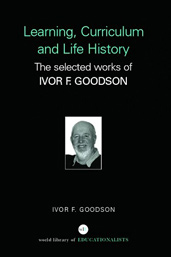Learning, Curriculum and Life Politics: the selected works of Ivor F. Goodson
Becoming a School Subject
The philosophical perspective is well summarized by the work of Hirst and Peters, and also Phenix. Hirst's position begins from a series of convictions that he defined in 1967 in a Schools Council Working Paper:
No matter what the ability of the child may be, the heart of all his development as a rational being is, I am saying, intellectual. Maybe we shall need very special methods to achieve this development in some cases. Maybe we have still to find the best methods for the majority of the people. But let us never lose sight of the intellectual aim upon which so much else, nearly everything else, depends. Secondly it seems to me that we must get away completely from the idea that linguistic and abstract forms of thought are not for some people (Hirst, 1967).
Hirst and Peters argue that 'the central objectives of education are developments of mind' and that such objectives are best pursued by the development of 'forms of knowledge' (a definition later broadened to include 'fields' of knowledge). From these forms and fields of knowledge so defined, school subjects can be derived and organized. Hence what is implied is that the intellectual discipline is created and systematically defined by a community of scholars, normally working in a university department, and is then 'translated' for use as a school subject.
This interpretation of Hirst's and Peters' work is commonly drawn, although not by the authors themselves. Other philosophers are more explicit. Phenix for instance states that: 'the general test for a discipline is that it should be the characteristic activity of an identifiable organized tradition of men of knowledge, that is of persons who are skilled in certain specified functions that they are able to justify by a set of intelligible standards'. The subsequent vision of school subjects as derived from the best work of specialist scholars, who act as initiators into scholarly traditions, is generally accepted both by educationists and laymen. It is a view supported by spokesmen for governmental and educational agencies, subject associations and, perhaps most significantly, the media.
- Phenix, P.M. (1964) The Realms of Meaning, New York: McGraw-Hill, p. 317.
